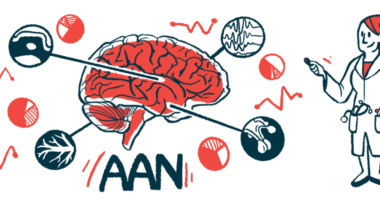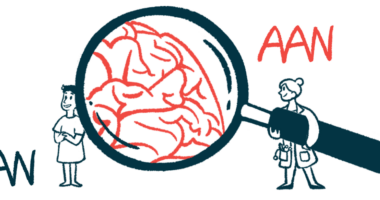Just Because I Don’t Feel Good Doesn’t Mean I Can’t Play

Some people go on vacations to play. For me, play is when I’m creating: writing columns, building garden landscapes, and being of service. Living with a chronic illness can be overwhelming. It helps to have a healthy sense of play, a playful mind, a lightness of being.
Being a journalist who writes about his personal experience with chronic illness throws me on the insight examination table every day. Readers often comment on how my words describe their experiences so clearly. This comes from self-insight applied constantly and often intensely.
Stuart Brown, MD, explores the concepts of play in his book “Play: How It Shapes the Brain, Opens the Imagination, and Invigorates the Soul.” Brown writes, “Play is a state of mind, rather than an activity. Remember the definition of play: an absorbing, apparently purposeless activity that provides enjoyment and a suspension of self-consciousness and sense of time. It … makes you want to do it again.”
Play is not an obsessive escape from what ails us. Life makes for good copy, but it is a recipe for emotional disaster when play is not added to the mix.
According to Brown, studies have found that people who continue to explore and learn throughout life can offset the more debilitating symptoms of neurological disease. As a writer advocating for the Parkinson’s community, I always have this lingering voice that says, “I can hold on to happiness.”
Brown also writes:
“If we stop playing, we share the fate of all animals that grow out of play. Our behavior becomes fixed. We are not interested in new and different things. When we stop playing, we stop developing and when that happens, the laws of entropy take over – things fall apart.”
Developing and working with TBM, my Parkinson’s self-management toolkit, is not a cure. It is designed for someone like me to manage my Parkinson’s and find ways to enjoy life with Mrs. Dr. C. TBM (threshold management, brain rewiring, and mindful movement) can’t fix everything; I need the addition of play.
I can identify with Brown when he says that the opposite of play is not work. The opposite is depression and a dulled soul.
It would be nice not to feel so bad many of these days. It would be nice not to constantly knock things over or dribble down my shirt, to walk as straight and tall as I did in my youth. Perhaps I could do something to prevent those annoying bursts of olfactory or auditory hallucinations, although they do lend a sense of the absurd. I am always searching, and I have found that taking play breaks helps my search for innovative approaches. I stop complaining because it wastes time better used for finding solutions.
I don’t spend time wishing things were different, not living in the moment, because that means I’m not practicing TBM. I’m just wallowing in my suffering, grasping for what is not yet attainable, and mourning bittersweet memories of what life was like before this chronic illness. Instead, I should remember that pleasures can still be discovered every day, despite how horrible I feel.
Play in my life takes many forms. I just need to pull my ostrich head out of the sickness sands long enough to see them, embrace them, and follow the path to lightness of being. Whether it is a computer game, moving a rock with the help of an enthusiastic family member, or sharing a garden walkabout with my partner, discovering what new plants have appeared, various forms of play manifest in my life. Lightness of being and the playful mind are always available.
This alternative lightness-of-being path is what I call “ordinary calmness.” It’s a way of living without grasping. It fits well with TBM and is just as difficult to practice. Ordinary calmness lets me find an enjoyable state of mind most of the time. Playing makes it easier.
For a journalist who spends so much time on introspection, I find the self-absorption and the nagging voice of “you haven’t done enough” can get intense. The practice of a playful mind (without guilt) helps balance that intensity with times that give me a sense of unfettered pleasure, time suspended, total involvement. I can be fully with someone in a shared moment of delight and play. I can enjoy my sanctuary gardens and seek the quiet mind as a doorway to ordinary calmness.
The practice of using the benefits of a playful mind to live a calm and centered life is part of my well of resources, and it’s important in my efforts to live better with Parkinson’s.
Note: Parkinson’s News Today is strictly a news and information website about the disease. It does not provide medical advice, diagnosis, or treatment. This content is not intended to be a substitute for professional medical advice, diagnosis, or treatment. Always seek the advice of your physician or another qualified health provider with any questions you may have regarding a medical condition. Never disregard professional medical advice or delay in seeking it because of something you have read on this website. The opinions expressed in this column are not those of Parkinson’s News Today or its parent company, BioNews, and are intended to spark discussion about issues pertaining to Parkinson’s disease.








Comments
Gail H. Reinke
Thank you the more we know the better off we wil bbe
karen provenzano
I totally agree with this article I am making myself feel better no matter what I feel better when try to hypnotize myself to act as if call it It works
Mike
Dr. C,
Very thought provoking piece. Feelings can be such a difficult thing for PwP’s. If I allow mine to control me it can relegate me to life on my couch because for me indeed the opposite of play is a depressed existence.
Since I have discovered my Parkinson’s play for me shows it self in many ways. I always enjoy participating in yours and other on-line conversations. Recently I have added letter writing to my nieces and nephews. Exercise , going to Movies with my wife and going to our favorite restaurants are another form of release for us. Thank-you Dr. C for reminding
me of the things that are in my life today that help keep me happy and satisfied including working with other PwP’s.
TBM is becoming part of my solution…thank you for that. I have practiced that for awhile but you have helped codify it for me. We must continue to live in the solution and resist the temptation to wallow which is the most selfish choice.
Blessings,
Mike
Eda marie gebell
I’m 76. PD lives with me every day. I hate the SOB. I refuse to let it take my happiness and I don’t tolerate pity. I’m to busy planning my next PLAYTIME ADVENTURE. I’m not gonna live till I die, I’m gonna die living. Okay?